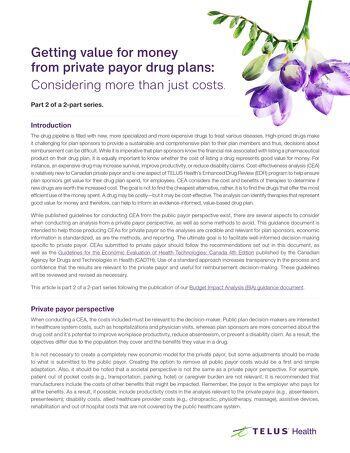
Following up on our Budget Impact Analysis (BIA) guidance document, TELUS Health has published guidance on cost-effectiveness analysis.
Pharmaceutical companies play a crucial role in ensuring their products are well-positioned within private payor drug plans. However, navigating the private payor landscape requires a thorough understanding of the factors that contribute to value. In an era of specialized and expensive drugs, it is not just about the cost, but also the overall value for money. To support pharmaceutical manufacturers in this endeavor, we present a concise guide that provides essential insights and recommendations for optimizing their products' chances of success in private payor drug plans.
Tailoring strategies for private payors
Private payor decision-makers have unique priorities, emphasizing drug costs and their impact on workplace productivity and employee well-being. To align with these objectives, pharmaceutical companies should incorporate relevant parameters into their drug development strategies and economic evaluations. This includes considering productivity costs, incorporating appropriate comparators, and demonstrating the impact on health-related quality of life in cost-utility analyses. By tailoring their approaches, pharmaceutical companies can enhance the value proposition of their products and foster successful partnerships with private payor drug plans.
As pharmaceutical companies strive to maximize value for money in private payor drug plans, understanding the needs and priorities of private payors is essential. By aligning drug development strategies, economic evaluations, and value demonstrations with the objectives of private payor decision-makers, manufacturers can enhance the chances of their products being reimbursed by these plans. The accompanying guidance document provides actionable insights and recommendations to help navigate the private payor landscape effectively to achieve reimbursement success.
Download your free guide:

